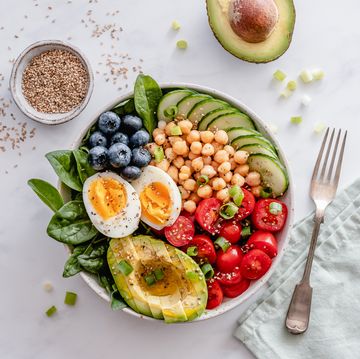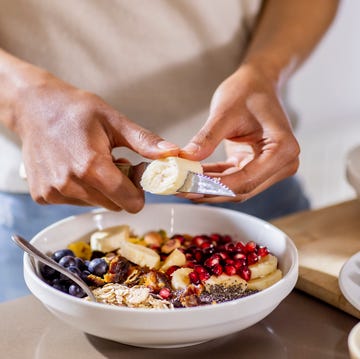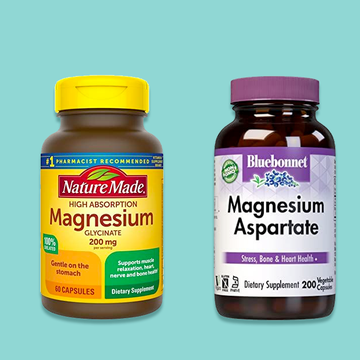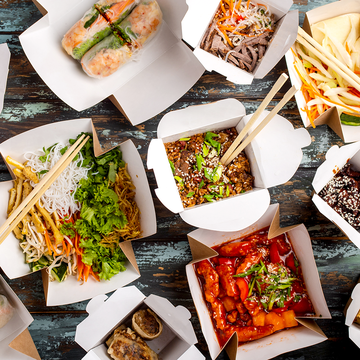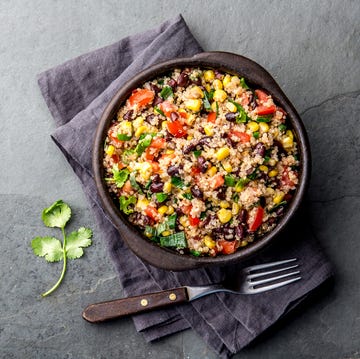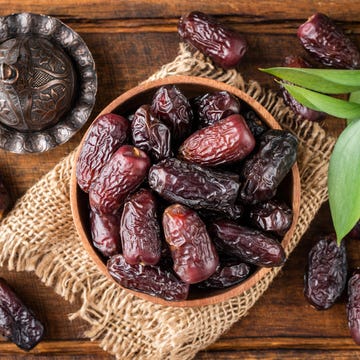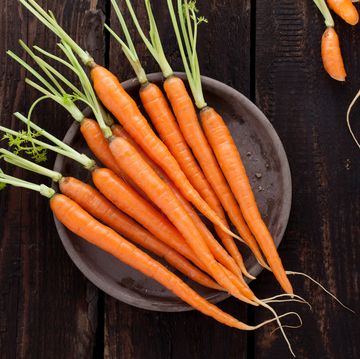Bananas sometimes get a bad rap for having lots of calories and carbs, but they're actually one of the best foods you can choose to eat — both for health and weight management. According to health experts, one banana a day provides your body with a lot of powerful nutrients, so go ahead and buy a bunch.
Keep reading for more about this superfood and its health benefits and nutritional stats.
Nutrition Stats
- 105 calories
- 27g carbohydrates
- 1g protein
- <1g total fat
- 0g saturated fat
- 3g fiber
- 14g sugar
- 422mg potassium (12% DV)
- 32mg magnesium (8% DV)
- 10.3mg vitamin C (17% DV)
- 0.433mg vitamin B6 (20% DV)
Health Benefits of Bananas
All those vitamins and nutrients can do major good for your body and mind. You're snacking toward these benefits every time you eat one:
- Lower blood pressure: The potassium and magnesium in bananas can help decrease this almighty number.
- A healthier heart: The blood pressure-lowering effects in turn reduce your risk of heart disease.
- Stronger bones: Potassium has been found to protect against osteoporosis, and magnesium plays a part in bone formation.
- Better digestion: Bananas provide about 12% of your daily fiber needs, promoting regularity.
- A sharper mind: The vitamin B6 in bananas may help prevent cognitive decline and reduce mood-related symptoms of PMS.
Now that you've got the basics, read on for the answers to questions nutritionists get about bananas all the time.
How many bananas can I eat and what should I eat them with?
One banana per day can help you meet your needs for produce and pack some serious health benefits. We love them paired with a source of lean protein and healthy fat.
Try these five healthy recipes that our on-staff nutritionists love:
- Bananas and nuts or nut butter
- A sliced banana and low-fat Greek yogurt
- Banana breakfast parfaits and smoothies
- Frozen banana pops dipped in chocolate
- Banana-based ice cream
But aren't bananas high in sugar?
While your average banana contains about 14 grams of naturally occurring sugar, it also provides plenty of other vitamins, minerals and important nutrients. Plus, the fiber content helps slow the absorption of sugar in the bloodstream, preventing the blood sugar spikes (and subsequent crashes!) felt from more concentrated sugar sources, like juice or soda.
Are bananas too high calorie if I'm on a diet?
It's true that eating any food in excess of your own personal calorie needs can lead to weight gain, but bananas are an unlikely culprit. At 100 calories and less than half a gram of fat in each one, bananas are a nutritious choice that helps you meet your needs for daily veggies and fruit.
Are bananas good to eat before exercising?
Bananas provide an easily digestible source of carbohydrates, the preferential fuel during exercise. They're light on your stomach, which won't weigh you down during your workouts. Alternatively, pair a banana with a protein source like peanut butter to refuel your glycogen stores post-workout. As a bonus, bananas can replace the potassium lost in sweat during prolonged exercise.
Is it safe to eat the peel?
While there are claims out there that banana peels can cure insomnia and depression and lower cholesterol, there is little (if any) scientific research to back them up. All the studies on the benefits of banana peels haven't involved humans just yet, so we don't actually know what effects they would have! That said, it's unlikely that eating a banana peel would hurt you – but it won't exactly taste very good either.







